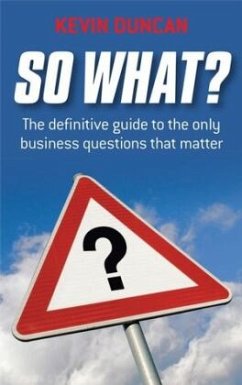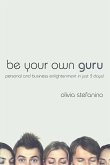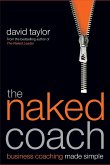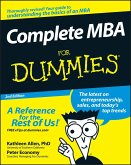20,99 €
inkl. MwSt.
Versandfertig in über 4 Wochen

10 °P sammeln
- Broschiertes Buch
- Merkliste
- Auf die Merkliste
- Bewerten Bewerten
- Teilen
- Produkt teilen
- Produkterinnerung
- Produkterinnerung
So What? gets straight to the point so you can cut through the noise and nonsense of work. Much of what we learn in our formative years is unlearnt in later life. As grown-ups we are often unable to answer the simplest of questions in a clear, direct way, and frequently have no idea why we are doing something. This can lead to crippling inefficiency in business, and goes some way to explaining why so many people spend so much time doing things that have no bearing on the true purpose. by behaving in a genuinely inquisitive way, you can get right to the heart of the matter and save yourself…mehr
Andere Kunden interessierten sich auch für
![Be Your Own Guru Be Your Own Guru]() Olivia StefaninoBe Your Own Guru20,99 €
Olivia StefaninoBe Your Own Guru20,99 €![Make Your First Million Make Your First Million]() Martin WebbMake Your First Million20,99 €
Martin WebbMake Your First Million20,99 €![The Naked Coach The Naked Coach]() David TaylorThe Naked Coach18,99 €
David TaylorThe Naked Coach18,99 €![Business FAQs Business FAQs]() Ken LangdonBusiness FAQs28,99 €
Ken LangdonBusiness FAQs28,99 €![Shake That Brain Shake That Brain]() Joel SaltzmanShake That Brain16,99 €
Joel SaltzmanShake That Brain16,99 €![Complete MBA for Dummies Complete MBA for Dummies]() Kathleen AllenComplete MBA for Dummies22,99 €
Kathleen AllenComplete MBA for Dummies22,99 €![So Smart But... So Smart But...]() Allen N. WeinerSo Smart But...24,99 €
Allen N. WeinerSo Smart But...24,99 €-
-
-
So What? gets straight to the point so you can cut through the noise and nonsense of work. Much of what we learn in our formative years is unlearnt in later life. As grown-ups we are often unable to answer the simplest of questions in a clear, direct way, and frequently have no idea why we are doing something. This can lead to crippling inefficiency in business, and goes some way to explaining why so many people spend so much time doing things that have no bearing on the true purpose.
by behaving in a genuinely inquisitive way, you can get right to the heart of the matter and save yourself hours, days, and even months of anguish. The questions So what?, Why?, How?, and When? can be hugely effective when applied in the right context, and this book shows you how to use them.
Once all the right questions have been posed, there is a final sure-fire method for testing whether something is relevant and helpful. By completing the sentence "Something must be wrong if...", it is simple to work out if you are wasting your time. For example, "Something must be wrong if I don't want to go to work in the morning."
So What? shows you how to become truly inquisitive again. So let the questions roll. Pay attention to what the answers are. Learn from them, and you will immediately improve your prospects of finally getting somewhere in life.
Hinweis: Dieser Artikel kann nur an eine deutsche Lieferadresse ausgeliefert werden.
by behaving in a genuinely inquisitive way, you can get right to the heart of the matter and save yourself hours, days, and even months of anguish. The questions So what?, Why?, How?, and When? can be hugely effective when applied in the right context, and this book shows you how to use them.
Once all the right questions have been posed, there is a final sure-fire method for testing whether something is relevant and helpful. By completing the sentence "Something must be wrong if...", it is simple to work out if you are wasting your time. For example, "Something must be wrong if I don't want to go to work in the morning."
So What? shows you how to become truly inquisitive again. So let the questions roll. Pay attention to what the answers are. Learn from them, and you will immediately improve your prospects of finally getting somewhere in life.
Hinweis: Dieser Artikel kann nur an eine deutsche Lieferadresse ausgeliefert werden.
Produktdetails
- Produktdetails
- Verlag: Wiley & Sons
- 1. Auflage
- Seitenzahl: 260
- Erscheinungstermin: 1. Februar 2008
- Englisch
- Abmessung: 214mm x 134mm x 17mm
- Gewicht: 330g
- ISBN-13: 9781841127934
- ISBN-10: 1841127930
- Artikelnr.: 23077675
- Herstellerkennzeichnung
- Libri GmbH
- Europaallee 1
- 36244 Bad Hersfeld
- gpsr@libri.de
- Verlag: Wiley & Sons
- 1. Auflage
- Seitenzahl: 260
- Erscheinungstermin: 1. Februar 2008
- Englisch
- Abmessung: 214mm x 134mm x 17mm
- Gewicht: 330g
- ISBN-13: 9781841127934
- ISBN-10: 1841127930
- Artikelnr.: 23077675
- Herstellerkennzeichnung
- Libri GmbH
- Europaallee 1
- 36244 Bad Hersfeld
- gpsr@libri.de
Kevin Duncan is a business adviser, marketing expert and author. He was educated at Oxford and has worked in communications for 25 years, advising companies such as British Airways, Carlsberg-Tetley, Diageo, Heineken, Lloyds SB, Marks & Spencer, Norwich Union, Reuters, Scottish Courage, Sony, and Virgin. He has hands-on knowledge of how to run most types of business, and has worked with over 200 clients in almost every category (except tobacco, which he won't work on). He has deployed £600m of funds on more than 200 brands, overseen over 1,000 projects, and won 35 awards for creativity and effectiveness. Kevin is the author of Running Your Own Business and Growing Your Business and teaches at Canterbury University. For the last eight years he has been an independent troublehooter, working on is own as expert Advice, advising companies how to run their businesses.
Introduction: Understanding the Value of Questions.
1. SO WHAT?
How to use the So what? cycle of questions.
How to use the So what? question.
For internal use only?
Internal So what? questions.
External So what? questions.
The art of inquisition.
The Inquisition Equations.
Learning from children.
Venting your feelings.
Sticking it to the man.
The power of feelings.
The importance of getting feelings out in the open.
Directional and pointed lines of inquiry.
Organizing your feelings.
Who cares about other people's feelings?
Interlocking your feelings with theirs.
What not to say, and when not to say it.
Pointless expressions of feelings.
Helpful, directional expressions of feelings.
The power of pointy thinking.
Getting the mix right.
Conceding ground to make progress.
The difference between an instruction and a true purpose.
Summary of So what? thinking.
So what? summary.
Exercise: Expressing your feelings.
2. WHY?
The power of Why?
What Why? means.
Why? For what reason?
Why? For what purpose?
Why? For what cause?
Whydunnit?
Why are we here?
How to use the Why? question.
Internal Why? questions.
External Why? questions.
"Three pipe" problems.
When asking Why?, stick to the facts.
The Why? chromosome.
How being inquisitive leads to success and job satisfaction.
If you need to ask Why?, the sooner you do it the better.
Why bother?
Write a list of what you are not going to do.
Why, oh why? Disgusted of Tunbridge Wells.
Constructive questioning: what are your better ideas?
Taking the edge off the Why? question.
Summary of Why? thinking.
Why? summary.
Exercise: Getting constructive questioning right.
3. HOW?
Time to take stock.
The power of How?
What How? means.
How? In what way?
How? In what manner?
How? By what means?
Ask How? early to avoid disappointment
"There's no such thing as a bad idea."
Yes there is!
How to use the How? question.
External How? questions.
Establish how not to do it.
Internal How? questions.
The killer How? question.
No room for vague.
Indirect How? questions: fl ush out and fl esh out.
Qualitative How? questions.
Hopeless answers to How? questions.
HOW? Resistor Type No. 1: Hackneyed Office Worker.
HOW? Resistor Type No. 2: Horrible Old Ways.
HOW? Resistor Type No. 3: Hunch Overcomes Wisdom.
Simple is good.
Subsidiary How? lines of inquiry.
How do you do? Finding out how others do it.
If you can't answer the How? question, ditch the project.
Firing off regular Howitzers.
Summary of How? thinking.
How? summary.
Exercise: Moving from concept to reality.
4. WHO?
What Who? means.
The cult of Who?
The power of Who?
How to use the Who? question.
External Who? questions.
Internal Who? questions.
Who? Which person?
Who me? I'm too busy.
Who? Which persons?
The kids are alright.
Whose responsibility?
If it's you, get your head straight.
Who are you?
If it's someone else, get the people right.
Spotting the wrong people.
Jargon and cliché red alert.
Who's next?
Who by numbers.
Won't get fooled again.
Summary of Who? thinking.
Exercise: Who is actually going to do this?
5. WHEN?
The power of When?
What When? means.
When? At what time?
When? Over what period?
Problem 1: Other stuff.
Problem 2: Vagueness.
How to use the When? question.
External When? questions.
Internal When? questions.
Understanding the time spectrum.
It's now or never.
Understanding time.
Long-, medium-, short-, and no-term.
Dealing with deadlines.
Introducing livelines.
How long is a deadline?
If you're going to panic, learn how to panic early.
Why essay crises don't work.
Bite-sized chunks.
Time lags and what to do about them.
The false metrics of the Finance Director.
Timing your run.
When did this happen before?
When will I see you again?
Whenever isn't enough.
Just say when.
Subsidiary When? questions.
Summary of When? thinking.
Exercise: When to publicize the plan.
6. WHERE?
What Where? means.
The power of Where?
How to use the Where? question.
In, at, or to what place, point, or position?
In, at, or to which place?
The importance of precision.
Where? In your head.
Where? Rough draft on paper.
Where? Refi ned computer copy.
Where? Colleagues and team exposure.
Where? Offi ce awareness.
Preparation: what you have to do beforehand.
Preparation: what they have to do beforehand.
Rules of engagement: what you have to do on the day.
Where? Town/city involvement.
Where? Country (multiple centres).
Where? (In)continent.
Where? Worldwide operation.
Wherehousing: dealing with multinational teams.
Where? Feedback.
The power of context.
Subsidiary Where? questions.
Wherever.
Wherewithal.
Wherewolves and how to track them down.
The whereafter.
Summary of Where? thinking.
Exercise: Hunt the colleague.
7. DO WE REALLY NEED TO DO THIS?
Recap of all the questions so far.
The power of Do we really need to do this?
What Do we really need to do this? means.
How to use the Do we really need to do this? question.
External Do we really need to do this? questions.
Internal Do we really need to do this? questions.
If it doesn't tick all the boxes, don't do it.
Do we really need to do this? Today.
Do we really need to do this? Tomorrow.
Do we really need to do this? Next week.
Do we really need to do this? Next month.
Do we really need to do this? Next year.
Do we really need to do this? Ever.
How does this compare with everything else we are doing?
What's the point of this?
To what effect?
Remind me. What was the original idea?
Do we really need to do this? summary.
Exercise: Ever or never.
8. SOMETHING MUST BE WRONG IF....
The power of Something must be wrong if....
What Something must be wrong if... means.
How to use the Something must be wrong if...statement.
External Something must be wrong if... statements.
No one wants to do it.
Everyone claims to be too busy.
There are other more pressing matters, apparently.
Postponement is suggested.
There isn't enough budget.
The right resources aren't immediately available.
Internal Something must be wrong if... statements.
I don't fancy it.
I've got a horrible feeling it's all going to go wrong.
I never did like the idea anyway.
I don't like the people I'm working with.
I don't want to go to work in the morning.
I can't be bothered to fi ll in the rest of this sentence.
Little voices: the value of speaking up.
The power of honesty.
Something must be wrong if... summary.
Exercise: Fill in the rest of this sentence.
9. ARE WE THERE YET?
Learning from children.
Surviving long journeys.
The power of Are we there yet?
How to use the Are we there yet? question.
External Are we there yet? questions.
Internal Are we there yet? questions.
Dealing with problems.
The value of originality.
The power of synectics.
Other childish questions.
Final roundup of questions.
Ready to make the leap?
Are we there yet? summary.
Exercise: Questioning everything like a child.
10. WHAT? AUTHOR'S POSTSCRIPT.
The What? question.
What's it all for? The meaning of life, and work.
Say what?
What are you doing?
If you don't know what you are doing....
Back to the beginning.
Exercise: What the @!*k am I doing?!
APPENDICES.
I Book Summaries.
II Origin of Time Divisions.
III Gottschaldt Figurine Solutions.
IV Bibliography.
INDEX.
1. SO WHAT?
How to use the So what? cycle of questions.
How to use the So what? question.
For internal use only?
Internal So what? questions.
External So what? questions.
The art of inquisition.
The Inquisition Equations.
Learning from children.
Venting your feelings.
Sticking it to the man.
The power of feelings.
The importance of getting feelings out in the open.
Directional and pointed lines of inquiry.
Organizing your feelings.
Who cares about other people's feelings?
Interlocking your feelings with theirs.
What not to say, and when not to say it.
Pointless expressions of feelings.
Helpful, directional expressions of feelings.
The power of pointy thinking.
Getting the mix right.
Conceding ground to make progress.
The difference between an instruction and a true purpose.
Summary of So what? thinking.
So what? summary.
Exercise: Expressing your feelings.
2. WHY?
The power of Why?
What Why? means.
Why? For what reason?
Why? For what purpose?
Why? For what cause?
Whydunnit?
Why are we here?
How to use the Why? question.
Internal Why? questions.
External Why? questions.
"Three pipe" problems.
When asking Why?, stick to the facts.
The Why? chromosome.
How being inquisitive leads to success and job satisfaction.
If you need to ask Why?, the sooner you do it the better.
Why bother?
Write a list of what you are not going to do.
Why, oh why? Disgusted of Tunbridge Wells.
Constructive questioning: what are your better ideas?
Taking the edge off the Why? question.
Summary of Why? thinking.
Why? summary.
Exercise: Getting constructive questioning right.
3. HOW?
Time to take stock.
The power of How?
What How? means.
How? In what way?
How? In what manner?
How? By what means?
Ask How? early to avoid disappointment
"There's no such thing as a bad idea."
Yes there is!
How to use the How? question.
External How? questions.
Establish how not to do it.
Internal How? questions.
The killer How? question.
No room for vague.
Indirect How? questions: fl ush out and fl esh out.
Qualitative How? questions.
Hopeless answers to How? questions.
HOW? Resistor Type No. 1: Hackneyed Office Worker.
HOW? Resistor Type No. 2: Horrible Old Ways.
HOW? Resistor Type No. 3: Hunch Overcomes Wisdom.
Simple is good.
Subsidiary How? lines of inquiry.
How do you do? Finding out how others do it.
If you can't answer the How? question, ditch the project.
Firing off regular Howitzers.
Summary of How? thinking.
How? summary.
Exercise: Moving from concept to reality.
4. WHO?
What Who? means.
The cult of Who?
The power of Who?
How to use the Who? question.
External Who? questions.
Internal Who? questions.
Who? Which person?
Who me? I'm too busy.
Who? Which persons?
The kids are alright.
Whose responsibility?
If it's you, get your head straight.
Who are you?
If it's someone else, get the people right.
Spotting the wrong people.
Jargon and cliché red alert.
Who's next?
Who by numbers.
Won't get fooled again.
Summary of Who? thinking.
Exercise: Who is actually going to do this?
5. WHEN?
The power of When?
What When? means.
When? At what time?
When? Over what period?
Problem 1: Other stuff.
Problem 2: Vagueness.
How to use the When? question.
External When? questions.
Internal When? questions.
Understanding the time spectrum.
It's now or never.
Understanding time.
Long-, medium-, short-, and no-term.
Dealing with deadlines.
Introducing livelines.
How long is a deadline?
If you're going to panic, learn how to panic early.
Why essay crises don't work.
Bite-sized chunks.
Time lags and what to do about them.
The false metrics of the Finance Director.
Timing your run.
When did this happen before?
When will I see you again?
Whenever isn't enough.
Just say when.
Subsidiary When? questions.
Summary of When? thinking.
Exercise: When to publicize the plan.
6. WHERE?
What Where? means.
The power of Where?
How to use the Where? question.
In, at, or to what place, point, or position?
In, at, or to which place?
The importance of precision.
Where? In your head.
Where? Rough draft on paper.
Where? Refi ned computer copy.
Where? Colleagues and team exposure.
Where? Offi ce awareness.
Preparation: what you have to do beforehand.
Preparation: what they have to do beforehand.
Rules of engagement: what you have to do on the day.
Where? Town/city involvement.
Where? Country (multiple centres).
Where? (In)continent.
Where? Worldwide operation.
Wherehousing: dealing with multinational teams.
Where? Feedback.
The power of context.
Subsidiary Where? questions.
Wherever.
Wherewithal.
Wherewolves and how to track them down.
The whereafter.
Summary of Where? thinking.
Exercise: Hunt the colleague.
7. DO WE REALLY NEED TO DO THIS?
Recap of all the questions so far.
The power of Do we really need to do this?
What Do we really need to do this? means.
How to use the Do we really need to do this? question.
External Do we really need to do this? questions.
Internal Do we really need to do this? questions.
If it doesn't tick all the boxes, don't do it.
Do we really need to do this? Today.
Do we really need to do this? Tomorrow.
Do we really need to do this? Next week.
Do we really need to do this? Next month.
Do we really need to do this? Next year.
Do we really need to do this? Ever.
How does this compare with everything else we are doing?
What's the point of this?
To what effect?
Remind me. What was the original idea?
Do we really need to do this? summary.
Exercise: Ever or never.
8. SOMETHING MUST BE WRONG IF....
The power of Something must be wrong if....
What Something must be wrong if... means.
How to use the Something must be wrong if...statement.
External Something must be wrong if... statements.
No one wants to do it.
Everyone claims to be too busy.
There are other more pressing matters, apparently.
Postponement is suggested.
There isn't enough budget.
The right resources aren't immediately available.
Internal Something must be wrong if... statements.
I don't fancy it.
I've got a horrible feeling it's all going to go wrong.
I never did like the idea anyway.
I don't like the people I'm working with.
I don't want to go to work in the morning.
I can't be bothered to fi ll in the rest of this sentence.
Little voices: the value of speaking up.
The power of honesty.
Something must be wrong if... summary.
Exercise: Fill in the rest of this sentence.
9. ARE WE THERE YET?
Learning from children.
Surviving long journeys.
The power of Are we there yet?
How to use the Are we there yet? question.
External Are we there yet? questions.
Internal Are we there yet? questions.
Dealing with problems.
The value of originality.
The power of synectics.
Other childish questions.
Final roundup of questions.
Ready to make the leap?
Are we there yet? summary.
Exercise: Questioning everything like a child.
10. WHAT? AUTHOR'S POSTSCRIPT.
The What? question.
What's it all for? The meaning of life, and work.
Say what?
What are you doing?
If you don't know what you are doing....
Back to the beginning.
Exercise: What the @!*k am I doing?!
APPENDICES.
I Book Summaries.
II Origin of Time Divisions.
III Gottschaldt Figurine Solutions.
IV Bibliography.
INDEX.
Introduction: Understanding the Value of Questions.
1. SO WHAT?
How to use the So what? cycle of questions.
How to use the So what? question.
For internal use only?
Internal So what? questions.
External So what? questions.
The art of inquisition.
The Inquisition Equations.
Learning from children.
Venting your feelings.
Sticking it to the man.
The power of feelings.
The importance of getting feelings out in the open.
Directional and pointed lines of inquiry.
Organizing your feelings.
Who cares about other people's feelings?
Interlocking your feelings with theirs.
What not to say, and when not to say it.
Pointless expressions of feelings.
Helpful, directional expressions of feelings.
The power of pointy thinking.
Getting the mix right.
Conceding ground to make progress.
The difference between an instruction and a true purpose.
Summary of So what? thinking.
So what? summary.
Exercise: Expressing your feelings.
2. WHY?
The power of Why?
What Why? means.
Why? For what reason?
Why? For what purpose?
Why? For what cause?
Whydunnit?
Why are we here?
How to use the Why? question.
Internal Why? questions.
External Why? questions.
"Three pipe" problems.
When asking Why?, stick to the facts.
The Why? chromosome.
How being inquisitive leads to success and job satisfaction.
If you need to ask Why?, the sooner you do it the better.
Why bother?
Write a list of what you are not going to do.
Why, oh why? Disgusted of Tunbridge Wells.
Constructive questioning: what are your better ideas?
Taking the edge off the Why? question.
Summary of Why? thinking.
Why? summary.
Exercise: Getting constructive questioning right.
3. HOW?
Time to take stock.
The power of How?
What How? means.
How? In what way?
How? In what manner?
How? By what means?
Ask How? early to avoid disappointment
"There's no such thing as a bad idea."
Yes there is!
How to use the How? question.
External How? questions.
Establish how not to do it.
Internal How? questions.
The killer How? question.
No room for vague.
Indirect How? questions: fl ush out and fl esh out.
Qualitative How? questions.
Hopeless answers to How? questions.
HOW? Resistor Type No. 1: Hackneyed Office Worker.
HOW? Resistor Type No. 2: Horrible Old Ways.
HOW? Resistor Type No. 3: Hunch Overcomes Wisdom.
Simple is good.
Subsidiary How? lines of inquiry.
How do you do? Finding out how others do it.
If you can't answer the How? question, ditch the project.
Firing off regular Howitzers.
Summary of How? thinking.
How? summary.
Exercise: Moving from concept to reality.
4. WHO?
What Who? means.
The cult of Who?
The power of Who?
How to use the Who? question.
External Who? questions.
Internal Who? questions.
Who? Which person?
Who me? I'm too busy.
Who? Which persons?
The kids are alright.
Whose responsibility?
If it's you, get your head straight.
Who are you?
If it's someone else, get the people right.
Spotting the wrong people.
Jargon and cliché red alert.
Who's next?
Who by numbers.
Won't get fooled again.
Summary of Who? thinking.
Exercise: Who is actually going to do this?
5. WHEN?
The power of When?
What When? means.
When? At what time?
When? Over what period?
Problem 1: Other stuff.
Problem 2: Vagueness.
How to use the When? question.
External When? questions.
Internal When? questions.
Understanding the time spectrum.
It's now or never.
Understanding time.
Long-, medium-, short-, and no-term.
Dealing with deadlines.
Introducing livelines.
How long is a deadline?
If you're going to panic, learn how to panic early.
Why essay crises don't work.
Bite-sized chunks.
Time lags and what to do about them.
The false metrics of the Finance Director.
Timing your run.
When did this happen before?
When will I see you again?
Whenever isn't enough.
Just say when.
Subsidiary When? questions.
Summary of When? thinking.
Exercise: When to publicize the plan.
6. WHERE?
What Where? means.
The power of Where?
How to use the Where? question.
In, at, or to what place, point, or position?
In, at, or to which place?
The importance of precision.
Where? In your head.
Where? Rough draft on paper.
Where? Refi ned computer copy.
Where? Colleagues and team exposure.
Where? Offi ce awareness.
Preparation: what you have to do beforehand.
Preparation: what they have to do beforehand.
Rules of engagement: what you have to do on the day.
Where? Town/city involvement.
Where? Country (multiple centres).
Where? (In)continent.
Where? Worldwide operation.
Wherehousing: dealing with multinational teams.
Where? Feedback.
The power of context.
Subsidiary Where? questions.
Wherever.
Wherewithal.
Wherewolves and how to track them down.
The whereafter.
Summary of Where? thinking.
Exercise: Hunt the colleague.
7. DO WE REALLY NEED TO DO THIS?
Recap of all the questions so far.
The power of Do we really need to do this?
What Do we really need to do this? means.
How to use the Do we really need to do this? question.
External Do we really need to do this? questions.
Internal Do we really need to do this? questions.
If it doesn't tick all the boxes, don't do it.
Do we really need to do this? Today.
Do we really need to do this? Tomorrow.
Do we really need to do this? Next week.
Do we really need to do this? Next month.
Do we really need to do this? Next year.
Do we really need to do this? Ever.
How does this compare with everything else we are doing?
What's the point of this?
To what effect?
Remind me. What was the original idea?
Do we really need to do this? summary.
Exercise: Ever or never.
8. SOMETHING MUST BE WRONG IF....
The power of Something must be wrong if....
What Something must be wrong if... means.
How to use the Something must be wrong if...statement.
External Something must be wrong if... statements.
No one wants to do it.
Everyone claims to be too busy.
There are other more pressing matters, apparently.
Postponement is suggested.
There isn't enough budget.
The right resources aren't immediately available.
Internal Something must be wrong if... statements.
I don't fancy it.
I've got a horrible feeling it's all going to go wrong.
I never did like the idea anyway.
I don't like the people I'm working with.
I don't want to go to work in the morning.
I can't be bothered to fi ll in the rest of this sentence.
Little voices: the value of speaking up.
The power of honesty.
Something must be wrong if... summary.
Exercise: Fill in the rest of this sentence.
9. ARE WE THERE YET?
Learning from children.
Surviving long journeys.
The power of Are we there yet?
How to use the Are we there yet? question.
External Are we there yet? questions.
Internal Are we there yet? questions.
Dealing with problems.
The value of originality.
The power of synectics.
Other childish questions.
Final roundup of questions.
Ready to make the leap?
Are we there yet? summary.
Exercise: Questioning everything like a child.
10. WHAT? AUTHOR'S POSTSCRIPT.
The What? question.
What's it all for? The meaning of life, and work.
Say what?
What are you doing?
If you don't know what you are doing....
Back to the beginning.
Exercise: What the @!*k am I doing?!
APPENDICES.
I Book Summaries.
II Origin of Time Divisions.
III Gottschaldt Figurine Solutions.
IV Bibliography.
INDEX.
1. SO WHAT?
How to use the So what? cycle of questions.
How to use the So what? question.
For internal use only?
Internal So what? questions.
External So what? questions.
The art of inquisition.
The Inquisition Equations.
Learning from children.
Venting your feelings.
Sticking it to the man.
The power of feelings.
The importance of getting feelings out in the open.
Directional and pointed lines of inquiry.
Organizing your feelings.
Who cares about other people's feelings?
Interlocking your feelings with theirs.
What not to say, and when not to say it.
Pointless expressions of feelings.
Helpful, directional expressions of feelings.
The power of pointy thinking.
Getting the mix right.
Conceding ground to make progress.
The difference between an instruction and a true purpose.
Summary of So what? thinking.
So what? summary.
Exercise: Expressing your feelings.
2. WHY?
The power of Why?
What Why? means.
Why? For what reason?
Why? For what purpose?
Why? For what cause?
Whydunnit?
Why are we here?
How to use the Why? question.
Internal Why? questions.
External Why? questions.
"Three pipe" problems.
When asking Why?, stick to the facts.
The Why? chromosome.
How being inquisitive leads to success and job satisfaction.
If you need to ask Why?, the sooner you do it the better.
Why bother?
Write a list of what you are not going to do.
Why, oh why? Disgusted of Tunbridge Wells.
Constructive questioning: what are your better ideas?
Taking the edge off the Why? question.
Summary of Why? thinking.
Why? summary.
Exercise: Getting constructive questioning right.
3. HOW?
Time to take stock.
The power of How?
What How? means.
How? In what way?
How? In what manner?
How? By what means?
Ask How? early to avoid disappointment
"There's no such thing as a bad idea."
Yes there is!
How to use the How? question.
External How? questions.
Establish how not to do it.
Internal How? questions.
The killer How? question.
No room for vague.
Indirect How? questions: fl ush out and fl esh out.
Qualitative How? questions.
Hopeless answers to How? questions.
HOW? Resistor Type No. 1: Hackneyed Office Worker.
HOW? Resistor Type No. 2: Horrible Old Ways.
HOW? Resistor Type No. 3: Hunch Overcomes Wisdom.
Simple is good.
Subsidiary How? lines of inquiry.
How do you do? Finding out how others do it.
If you can't answer the How? question, ditch the project.
Firing off regular Howitzers.
Summary of How? thinking.
How? summary.
Exercise: Moving from concept to reality.
4. WHO?
What Who? means.
The cult of Who?
The power of Who?
How to use the Who? question.
External Who? questions.
Internal Who? questions.
Who? Which person?
Who me? I'm too busy.
Who? Which persons?
The kids are alright.
Whose responsibility?
If it's you, get your head straight.
Who are you?
If it's someone else, get the people right.
Spotting the wrong people.
Jargon and cliché red alert.
Who's next?
Who by numbers.
Won't get fooled again.
Summary of Who? thinking.
Exercise: Who is actually going to do this?
5. WHEN?
The power of When?
What When? means.
When? At what time?
When? Over what period?
Problem 1: Other stuff.
Problem 2: Vagueness.
How to use the When? question.
External When? questions.
Internal When? questions.
Understanding the time spectrum.
It's now or never.
Understanding time.
Long-, medium-, short-, and no-term.
Dealing with deadlines.
Introducing livelines.
How long is a deadline?
If you're going to panic, learn how to panic early.
Why essay crises don't work.
Bite-sized chunks.
Time lags and what to do about them.
The false metrics of the Finance Director.
Timing your run.
When did this happen before?
When will I see you again?
Whenever isn't enough.
Just say when.
Subsidiary When? questions.
Summary of When? thinking.
Exercise: When to publicize the plan.
6. WHERE?
What Where? means.
The power of Where?
How to use the Where? question.
In, at, or to what place, point, or position?
In, at, or to which place?
The importance of precision.
Where? In your head.
Where? Rough draft on paper.
Where? Refi ned computer copy.
Where? Colleagues and team exposure.
Where? Offi ce awareness.
Preparation: what you have to do beforehand.
Preparation: what they have to do beforehand.
Rules of engagement: what you have to do on the day.
Where? Town/city involvement.
Where? Country (multiple centres).
Where? (In)continent.
Where? Worldwide operation.
Wherehousing: dealing with multinational teams.
Where? Feedback.
The power of context.
Subsidiary Where? questions.
Wherever.
Wherewithal.
Wherewolves and how to track them down.
The whereafter.
Summary of Where? thinking.
Exercise: Hunt the colleague.
7. DO WE REALLY NEED TO DO THIS?
Recap of all the questions so far.
The power of Do we really need to do this?
What Do we really need to do this? means.
How to use the Do we really need to do this? question.
External Do we really need to do this? questions.
Internal Do we really need to do this? questions.
If it doesn't tick all the boxes, don't do it.
Do we really need to do this? Today.
Do we really need to do this? Tomorrow.
Do we really need to do this? Next week.
Do we really need to do this? Next month.
Do we really need to do this? Next year.
Do we really need to do this? Ever.
How does this compare with everything else we are doing?
What's the point of this?
To what effect?
Remind me. What was the original idea?
Do we really need to do this? summary.
Exercise: Ever or never.
8. SOMETHING MUST BE WRONG IF....
The power of Something must be wrong if....
What Something must be wrong if... means.
How to use the Something must be wrong if...statement.
External Something must be wrong if... statements.
No one wants to do it.
Everyone claims to be too busy.
There are other more pressing matters, apparently.
Postponement is suggested.
There isn't enough budget.
The right resources aren't immediately available.
Internal Something must be wrong if... statements.
I don't fancy it.
I've got a horrible feeling it's all going to go wrong.
I never did like the idea anyway.
I don't like the people I'm working with.
I don't want to go to work in the morning.
I can't be bothered to fi ll in the rest of this sentence.
Little voices: the value of speaking up.
The power of honesty.
Something must be wrong if... summary.
Exercise: Fill in the rest of this sentence.
9. ARE WE THERE YET?
Learning from children.
Surviving long journeys.
The power of Are we there yet?
How to use the Are we there yet? question.
External Are we there yet? questions.
Internal Are we there yet? questions.
Dealing with problems.
The value of originality.
The power of synectics.
Other childish questions.
Final roundup of questions.
Ready to make the leap?
Are we there yet? summary.
Exercise: Questioning everything like a child.
10. WHAT? AUTHOR'S POSTSCRIPT.
The What? question.
What's it all for? The meaning of life, and work.
Say what?
What are you doing?
If you don't know what you are doing....
Back to the beginning.
Exercise: What the @!*k am I doing?!
APPENDICES.
I Book Summaries.
II Origin of Time Divisions.
III Gottschaldt Figurine Solutions.
IV Bibliography.
INDEX.







